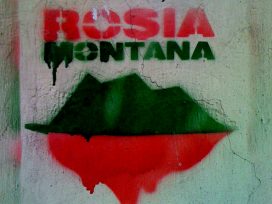Twenty years after Israeli Prime Minister Yitzhak Rabin and PLO leader Yasser Arafat shook hands over the Oslo Accords, Frida Skatvik reveals how Norway ended up a broker of peace in the Middle East and assesses the legacy of the ensuing peace process.
Articles
Read more than 6000 articles in 35 languages from over 90 cultural journals and associates.
A controversial tweet by Richard Dawkins prompts incoming New Humanist editor Daniel Trilling to set out some basic principles concerning the way we discuss religion. He argues that finding common ground between people of different religious beliefs and none is key to political progress.

The prospect of Romania’s parliament passing new legislation, allowing the expropriation of citizens’ homes to make way for Europe’s largest gold mine, has prompted some of the country’s most significant protests since the fall of communism. Claudia Ciobanu reports.
The right to basic connectivity
Freedom of speech and association in a digital world
Basic connectivity, defined as the capacity to speak and associate online, should be considered as something approaching a civic entitlement rather than a service available to consumers in the marketplace, argues Robert Reich.
Until 1991, Ukraine had largely failed to establish a narrative for itself in the world. Peter Pomerantsev shows how, thereafter, a new literature emerged that made contemporary Ukrainian writers Europe’s grittier Latin Americans, mixing magical realism with domestic abuse, folklore and mafia.

When the feet become the head
Gezi and its aftermath
Widespread calls for the resignation of those responsible for the police brutality in Gezi Park prompted Erdogan to retort at the time: “Since when have the feet become the head?” Such rhetoric leaves Osman Deniztekin deeply concerned for the state of democracy in Turkey.
When people refuse to engage with the state, they present an opportunity for the state’s worst autocratic tendencies to kick in, argues Paolo Gerbaudo. Wherein lie the roots of the Egyptian army’s removal of the country’s first elected president after the massive 30 June protests.
Though homosexuality was decriminalized in Russia in 1993, an increasingly restrictive legal climate and widespread intolerance continue to hamper the lives of gay men and women. Nonetheless, LGBT networks continue to develop support systems of their own.
In an unpublished, semi-autobiographical novel, Sergey Khazov draws on his experience of growing up gay in Russia. Extracts.
Doves are a symbol of peace, purity and fertility. They were once of practical use too: until science intervened, dove droppings were essential to the manufacture of fertiliser. So just how did they end up at the bottom of the urban symbolic order? Fahim Amir investigates.
Everyday advice on everyday love
Romantic expertise in mid-twentieth century Britain
Whilst there has been significant historiographical interest in the provision of modern sexual education, historians have paid less attention to the mechanisms through which emotional advice circulated and the ways in which it was received. Focusing on “everyday” forms of advice, Claire Langhamer studies relationships between agony aunts and their readers to map broader shifts in emotional authority.

Traditional libraries are increasingly putting their holdings online, if not in competition with Google Books then in partnership, in order to keep pace with the mass digitization of content. Yet it isn’t only the big institutional actors that are driving this process forward: small-scale, independent initiatives based on open source principles offer interesting approaches to re-defining the role and meaning of the library, writes Alessandro Ludovico.
As emerging markets command influence on the international stage, Saul Estrin and Kirsty Hughes look at the impact on economics, politics and human rights.

The future council
New forms of democratic participation
Decisions on large-scale infrastructure projects and sustainable energy development must draw on dialogue-based processes. “Future councils” can provide a basis for political identity through the expression of regional cohesion and clarify the implications that large infrastructure projects have at a local level.
If Gombrowicz would have written these notes just for himself, to refresh his memory, he would have asked his wife to destroy the manuscript. On the contrary: he always wanted her to save “Kronos” from the fire. It was meant to survive, writes Pawel Majewski.